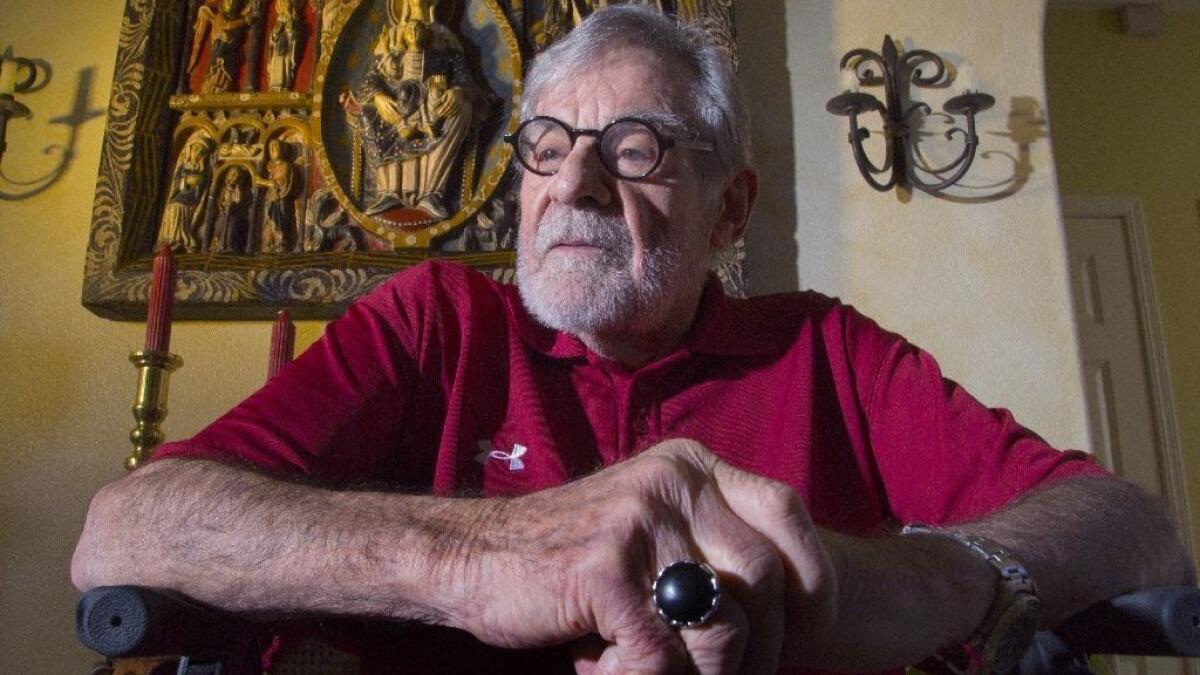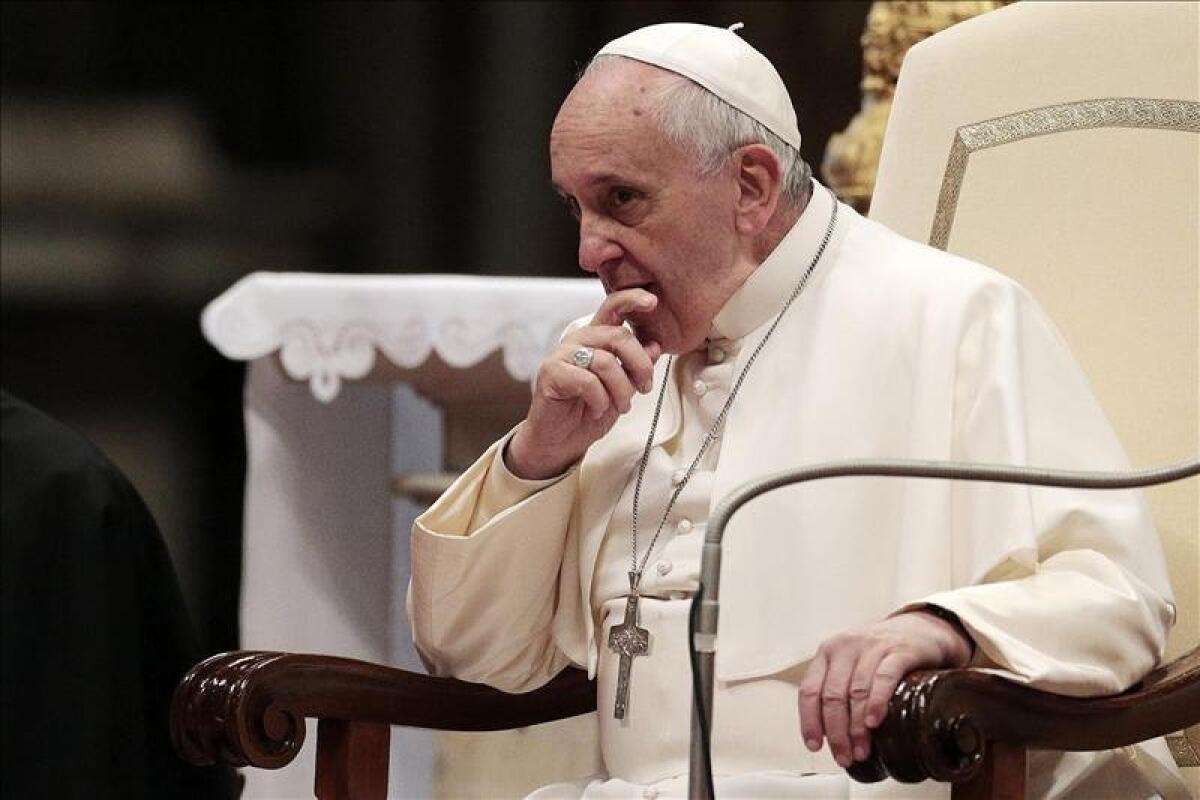Column: A heroic ex-priest immortalized in ‘Spotlight’ uncovered years of Catholic abuse and cover-ups. In death, he has been vindicated

- Share via
All through the Catholic Church molestation scandals that rocked Los Angeles and Orange Counties, I checked in regularly with an ex-priest named Richard Sipe.
From his home in La Jolla, Sipe would offer me scholarly breakdowns on what was happening in California and the rest of the world — on how an institution whose cross stands as a moral compass could harm children, scar them for life and dismiss their suffering in the interest of self-preservation.
Sipe would throw a light on that dark culture of hypocrisy, abuse and cover-ups, and tell me it extended all the way to Rome. The Archdiocese of Los Angeles run by Cardinal Roger Mahony was one of the worst examples of the church’s failings, in his opinion.
“Mahony has no conscience,” Sipe told me in 2013, just after the release of church records that documented efforts by Mahony and a top advisor to conceal molesting priests from police. Sipe decried Mahony’s self-serving spin on years of misdeeds that had resulted in a $660-million settlement involving more than 500 cases of abuse.

Even when scandals were splashed onto the pages of newspapers in Los Angeles, Boston and elsewhere — and church leaders were shamed into adopting reforms on the reporting of suspected abusers — Sipe did not rest.
He warned that the sins of the church were deeply ingrained, and that the culture of corruption had not changed.
“Bishops are not accountable,” he said in 2008. “They can — and do — what they want.”
Sipe was not out to destroy the church over its malevolent hypocrisy, but rather to save it from its own worst instincts, to preserve what was honorable about the institution and the service of good priests, and to prevent the abuse of more children.
Whether ignored or vindicated, Sipe kept burning candles, fighting for transparency and true reform until his death, at 85, earlier this month at his home in La Jolla. Before and after he died, the news was filled with more evidence of the moral failings he had chronicled.
Cardinal Theodore McCarrick, formerly archbishop of Washington, D.C., was removed from public ministry by Pope Francis amidst allegations that include sexual contact with seminarians and the fondling of an altar boy.
Sipe had warned the church about McCarrick for years, detailing allegations on his website, to no avail.
In Pennsylvania, a grand jury released findings of an investigation into abuses of more than 1,000 children by 301 predator priests. The report outlined the church “playbook for concealing the truth.” One of those implicated was Cardinal Donald Wuerl, who transferred an accused molester to parishes in California. Wuerl later replaced McCarrick as archbishop in Washington.
Sipe had warned the church about Wuerl in 2016, to no avail.
And now, in the midst of abuse scandals in the U.S., Chile and Australia, a Vatican official alleged Pope Francis and his predecessor Pope Benedict XVI knew about but did not act on allegations against McCarrick.
It’s as if, in Sipe’s death, the church’s penance is the validation of his life’s work.
“He would be in the middle of this,” Sipe’s wife, Dr. Marianne Benkert Sipe, told me this week. “It’s all there in his early writings.”
Sipe was ordained in 1959 and soon became aware of priests who had relationships with adults and children. Later, he worked at a Baltimore psychiatric institute where abusive priests were sent for treatment and evaluation, and he began documenting their stories. With the help of his future wife, a psychiatrist at the institute, he published a 1990 book called, “A Secret World: Sexuality and the Search for Celibacy.”
Sipe, an expert witness in hundreds of clergy abuse cases, argued that celibacy and abuse were connected. We’re sexual creatures, he said, so celibacy is an unnatural expectation, and sex and sexual abuse are rampant among priests.
Those who abuse minors, he explained, have a convenient racket going. Peers may keep quiet because they’re predators too, and even if the abuse is reported to superiors, they’ve got reasons to maintain the code of silence. Maybe they don’t want to damage the image of the church. Or maybe they have their own sins to hide.
So pedophiles remain in ministry, or they’re shuffled to another parish, or to Mexico. Often, there’s no attempt to explain what’s happening to parishioners, to call the police or to do the most basic, caring, human thing — to offer an apology, comfort and support to victims.
“Every time Richard wrote, and every time he spoke to an investigator or a journalist, he would say this goes to the highest realms of the Vatican,” said Patrick Wall, a friend and colleague of Sipe’s who is also a former priest and is a canon lawyer.
Sipe is one of the heroes in the Oscar-winning movie “Spotlight,” when his character, played by Richard Jenkins, delivers a bombshell to investigative reporters from the Boston Globe. Based on his years of research, he tells them, celibacy is a lie, and as many as 50% of priests are sexually active and 6% are molesters.
The team quickly does the math. With 1,500 priests in Boston, if Sipe was right, that meant 90 potential molesters. If anything, Sipe’s estimate was low.
“Richard Sipe was our guide, our teacher, our chief cheerleader,” Globe correspondent Michael Rezendes wrote in an appreciation of the ex-priest’s insights.
Phil Saviano, one of the victims in Boston and another character in “Spotlight,” said he first understood that abuse was widespread by reading Sipe’s “Secret World.” Sipe, he said, became a heroic figure to him, and later a friend.
“The priesthood was a great place for pedophiles,” said Saviano. “You get assigned to a parish and from the first day of your assignment you have immediate respectability because you’re wearing the collar and you were sent by the bishop. And supposedly, because you’re celibate, you’re sexually safe. And then you have access to all these kids, these altar boys, these Girl Scout troops that meet in the church basement.”
Sipe’s wife said three ways forward for the church are for priests to be allowed to marry, for women to be ordained as priests, and for bishops to break the code of silence and report abuse.
Saviano said the church won’t change until parishioners stop donating on Sunday and more prosecutors do what the attorney general’s office just did in Pennsylvania. Despite only two indictments so far, outrage over the revelations has led to calls for extending the statute of limitations so molesters and those who cover for them can face civil or criminal charges.
In California, local and federal investigations did not lead to charges against Mahony and his top minions, to the dismay of many. Prosecutors argued that the statute of limitations made it difficult to prosecute.
Lawyer Anthony DeMarco, who represented about 400 plaintiffs in the $660-million settlement with the L.A. archdiocese, said victims were “thirsting” for a grand jury crackdown that never happened, despite strong evidence of abuse and cover-ups.
Wall, the ex-priest and Sipe’s colleague, is one of several church reform activists hoping California Atty. Gen. Xavier Becerra follows the Pennsylvania model.
“If a grand jury report ever happened in California,” said Wall, “it would show you the road map and it would show you the ultimate cover-up that leads all the way to the Holy See.”
In a letter he wrote to San Diego Bishop Robert McElroy two years ago this week, Sipe listed misdeeds he knew of that involved numerous high-ranking archbishops, bishops and monsignors. He laid out the “systemic dynamic … that fosters sexual violations.”
In the case of Mahony, Sipe detailed extreme defense tactics — the hiring of “several law firms” and a crisis management company used by Enron and the tobacco industry.
“Sooner or later it will become broadly obvious that there is a systemic connection between the sexual activity by, among and between clerics … and the abuse of children,” Sipe wrote to McElroy, whose diocese settled 144 cases for nearly $200 million in 2007.
Sipe appealed to McElroy for “pastoral attention to victims of abuse,” including those who attempted to take their own lives.
“Only a bishop can minister to these wounds,” Sipe wrote. “Enclosed you will find a list of all the bishops who have been found wanting in their duties to the people of God.”
Get more of Steve Lopez’s work and follow him on Twitter @LATstevelopez
More to Read
Sign up for Essential California
The most important California stories and recommendations in your inbox every morning.
You may occasionally receive promotional content from the Los Angeles Times.











